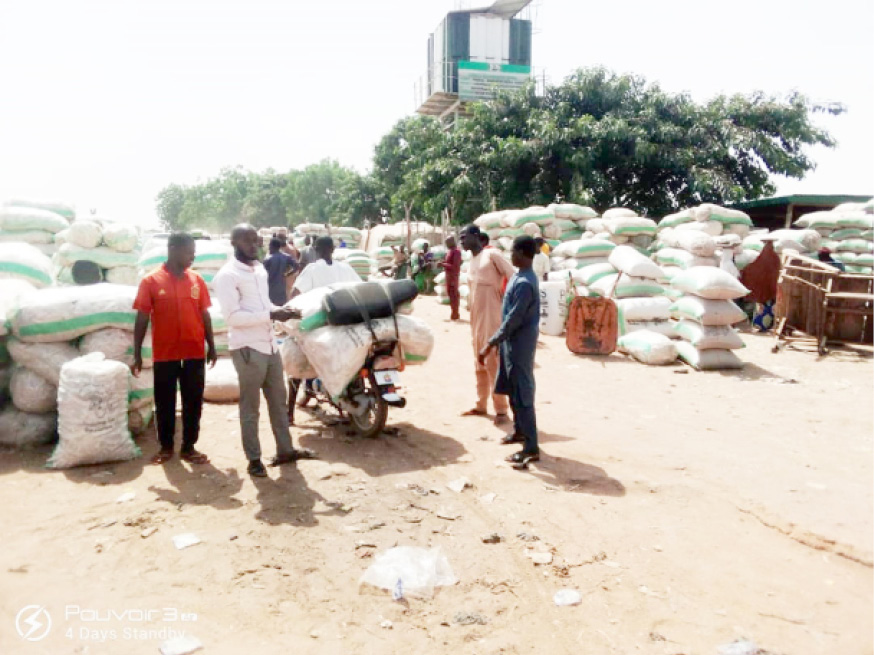Why prices of grains crashed in Taraba
Shortly after harvest, our correspondent in Taraba State observed that the presence of grains buyers was unprecedented across rural markets in the state. Daily Trust, meanwhile, gathered that the rush by grains merchants to buy up farm produce was in anticipation of a possible increase in the price of petroleum products, which will automatically trigger […]

Mutumbiyu grains market (Kasuwan Buhu) in Taraba State
Shortly after harvest, our correspondent in Taraba State observed that the presence of grains buyers was unprecedented across rural markets in the state.
Daily Trust, meanwhile, gathered that the rush by grains merchants to buy up farm produce was in anticipation of a possible increase in the price of petroleum products, which will automatically trigger a rise in prices.
- Aregbesola’s hometown’s monarch endorses Oyetola for second term
- NIGERIA DAILY: What Racketeers Make Off Nigerians As Fuel Scarcity Persists
The development, it was gathered, pushed the prices of farm produce up.
For example, the price of a 100kg bag of maize rose to an all-time high of N25,000 while the same bag size of sorghum was sold at N30,000.
Similarly, prices of beans, paddy rice, locally processed rice, dried cassava, soya beans and millet also went up.
Findings revealed that 100kg bag of beans went up to N41,000, paddy rice N15,000 per 100kg bag and 100kg bag of locally processed rice went for N52,000.
However, soon after the announcement by the federal government that there will be no fuel price increase, prices of farm produce crashed in the state while trading activities at the grains markets reduced drastically.
It was revealed that the price of 100kg bag of maize dropped from N25,000 to between N16,000 and N17,000.
The price of 100kg bag of white beans reduced from N41,000 to N32,000;100kg bag of guinea corn also dropped from N37,000 to N23,000 while a 100kg bag of paddy rice which was sold at N15,000 is now sold at N12,000.
A bag of locally processed rice came down from N47,000 to between N40,000 and N41,000 and 100kg bag of soya beans dropped from N37,000 to N30,000.
A large-scale farmer, Ali Maihula, told Daily Trust that many middlemen have made bulk purchases of farm produce from major grains markets across the state thinking that fuel price will be increased.
He said the idea for bulk purchase by the grains merchants was to hoard the commodity and increase prices after the fuel price increase.
“At the time news of fuel price increase was spreading, there were middlemen and grains merchants everywhere in the rural markets making bulk purchases of farm produce but soon after the announcement that there will be no fuel price increase, the hoarders left the markets,” he said.
Alhaji Bello Dauda, a middleman at Mutumbiyu grains market, also told Daily Trust that it was an annual trend that sees grains merchants making bulk purchases in markets across the state.
He said however that the number of grains merchants this year was double that of previous years, adding that there were merchants who deposited over N50 million to their agents to purchase farm produce for them.
He said the merchants’ intention was to make more profit after the fuel price increase but to their dismay, that was not to be.
“Business activities at grains markets came to a halt after the announcement by the federal government suspending the planned fuel price increase,” he said.
According to him, more than 12 trailer-loads of grains leave the market on a daily basis to various destinations but now only a few trucks were loaded.
A produce officer with the state Ministry of Agriculture, who would not like his name mentioned, said more than 110 trucks loaded with grains leave the state to various destinations in the country on a daily basis.
He said reports indicate that most of the produce ended up in warehouses except those purchased by rice processing companies, poultry farms and other companies using maize and soya beans as raw materials.
A large-scale farmer, Umar Saidu, also said the absence of grains merchants in the markets was responsible for the crash in the prices of foodstuffs in the state.
Daily Trust’s findings revealed that over the years, many businessmen have shifted to the grains business because of its profit.
Many merchants, it was gathered, took short-term loans from commercial banks and from individuals to buy grains in large quantities and hoard waiting for prices to go up.
A businessman, Yakubu Sani, said since the ban on importation of rice and maize by the federal government, many businessmen have joined the business of farm produce hoarding.
“I know some businessmen who started the business a few years ago with small capital but today they have made millions of naira. However, this year, many of such people will incur losses if the price of grain does not rise,” he said.
